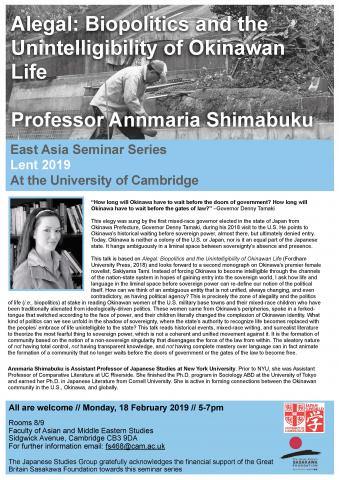Alegal: Biopolitics and the Unintelligibility of Okinawan Life
“How long will Okinawa have to wait before the doors of government? How long will Okinawa have to wait before the gates of law?” –Governor Denny Tamaki
This elegy was sung by the first mixed-race governor elected in the state of Japan from Okinawa Prefecture, Governor Denny Tamaki, during his 2018 visit to the U.S. He points to Okinawa’s historical waiting before sovereign power, almost there, but ultimately denied entry. Today, Okinawa is neither a colony of the U.S. or Japan, nor is it an equal part of the Japanese state. It hangs ambiguously in a liminal space between sovereignty’s absence and presence.
This talk is based on Alegal: Biopolitics and the Unintelligibility of Okinawan Life (Fordham University Press, 2018) and looks forward to a second monograph on Okinawa’s premier female novelist, Sakiyama Tami. Instead of forcing Okinawa to become intelligible through the channels of the nation-state system in hopes of gaining entry into the sovereign world, I ask how life and language in the liminal space before sovereign power can re-define our notion of the political itself. How can we think of an ambiguous entity that is not unified, always changing, and even contradictory, as having political agency? This is precisely the zone of alegality and the politics of life (i.e., biopolitics) at stake in reading Okinawan women of the U.S. military base towns and their mixed-race children who have been traditionally alienated from ideologically-driven politics. These women came from Okinawa’s peripheries, spoke in a forked-tongue that switched according to the face of power, and their children literally changed the complexion of Okinawan identity. What kind of politics can we see unfold in the shadow of sovereignty, where the state’s authority to recognize life becomes replaced with the peoples’ embrace of life unintelligible to the state? This talk reads historical events, mixed-race writing, and surrealist literature to theorize the most fearful thing to sovereign power, which is not a coherent and unified movement against it. It is the formation of community based on the notion of a non-sovereign singularity that disengages the force of the law from within. The aleatory nature of not having total control, not having transparent knowledge, and not having complete mastery over language can in fact animate the formation of a community that no longer waits before the doors of government or the gates of the law to become free.
Bio: Annmaria Shimabuku is Assistant Professor of Japanese Studies at New York University. Prior to NYU, she was Assistant Professor of Comparative Literature at UC Riverside. She finished the Ph.D. program in Sociology ABD at the University of Tokyo and earned her Ph.D. in Japanese Literature from Cornell University. She is active in forming connections between the Okinawan community in the U.S., Okinawa, and globally.

